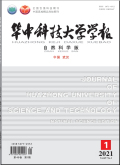华中科技大学学报(自然科学版)2024,Vol.52Issue(3):105-112,8.DOI:10.13245/j.hust.240447
基于近场动力学理论的圆柱壳体渐进损伤分析
Progressive damage analysis of cylindrical shell based on peridynamics theory
摘要
Abstract
To study the strength damage mechanism of cylindrical shell under lateral pressure,the initiation,propagation and evolution of shell strength damage were simulated by peridynamics numerical method.Firstly,the bond-based peridynamic(BPD)theory was reviewed.Considering the influence of long-range forces on the calculation accuracy of BPD model,a kernel function was introduced into the model,and an improved BPD model suitable for solving three-dimensional problems was established.Secondly,the maximum strain criterion was embedded into the improved model as assessment standard for bond break.The numerical simulation of strength damage behavior under monotonically increasing lateral pressure was realized by FORTRAN programming.Finally,the damage evolution process was analyzed.Simulation results show that the initiation damage zones originate from the inner wall of the shell and are evenly distributed at 90°.As the pressure increases,two new failure zones occur in the outer wall of the cylinder,and then the failure zones in the inner and outer walls propagates toward to the middle surface of the cylinder.During the whole damage evolution process,the failure degree of shell behaves exponential growth with the pressure linear increase.The established model can provide guidance for the strength prediction and protection of cylinder under complex loads.关键词
近场动力学/圆柱壳体/强度/渐进损伤/侧压Key words
peridynamics/cylindrical shell/strength/progressive damage/lateral pressure分类
数理科学引用本文复制引用
蒋雷雷,沈克纯,潘光,黄毅华..基于近场动力学理论的圆柱壳体渐进损伤分析[J].华中科技大学学报(自然科学版),2024,52(3):105-112,8.基金项目
国家自然科学基金资助项目(52101376) (52101376)
中央高校基本科研业务费专项资金资助项目(3102019JC006). (3102019JC006)

